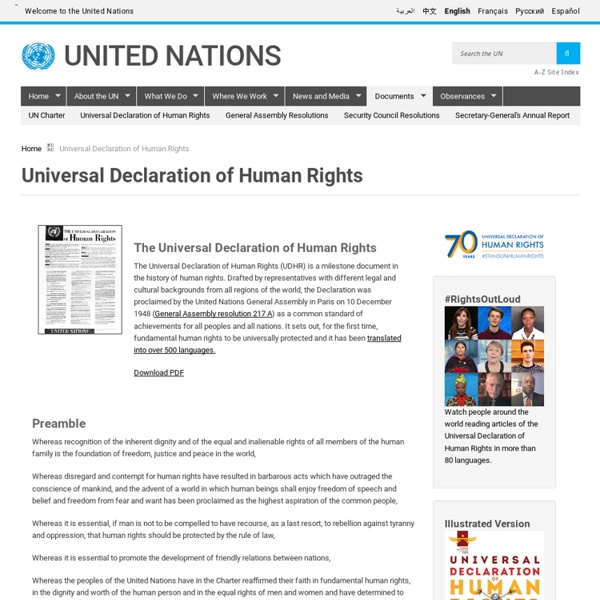Themes of Catholic Social Teaching « Catholic Social Teaching
Human Dignity We must recognise we are all brothers and sisters which requires us to respect, value and uphold a common dignity for ourselves and each other. As human beings we are created in the image and likeness of God so therefore we have an inherent worth and distinction. Community and Participation
Sustainable Development Goals
Sustainable Development Goals End poverty in all its forms everywhere End hunger, achieve food security and improved nutrition and promote sustainable agriculture Ensure healthy lives and promote well-being for all at all ages Ensure inclusive and equitable quality education and promote lifelong learning opportunities for all Achieve gender equality and empower all women and girls
On the Universality of Human Rights
Founded in 1961, Amnesty International is the world's largest human rights organization, with over one million members worldwide. The organization works to free prisoners of conscience, to gain fair trials for political prisoners, to end torture and political killings, and to abolish the death penalty throughout the world. In 1977 Amnesty International was awarded the Nobel Peace Prize. Amnesty International's main Web site is www.amnesty.org. Last spring my friend's teenage son quizzed me about the work of Amnesty International in a conversation best described as politely aggressive.
Project Compassion 2016 - Caritas Australia's annual humanitarian fundraising event
Caritas Australia’s annual Lenten fundraising and awareness-raising appeal brings thousands of Australians together in solidarity with the world's poor to help end poverty, promote justice and uphold dignity. 50 years of Project Compassion In 2016, we celebrate 50 years since the first national appeal was held in Lent of 1965. The appeal raised the equivalent of $90,000 towards community 'self-help' projects in countries like Papua New Guinea, Vietnam and Malaysia. Take a trip down memory lane Thank you for your support in 2015
Inequality – ACOSS
Excessive inequality is a problem for any society. It means that people have unequal ability to take part in social and economic opportunities, and it undermines the cohesiveness of that society. Excessive inequality is a problem for any economy. Resources become concentrated in fewer hands, resulting in reduced economic participation for the majority.
Lesson 8 - What are human rights?
Overview Through an interactive marketplace activity, students discover that we never have to choose our human rights, they belong to everybody in the world and every human right is needed to live and grow. Download the teacher notes for the full lesson plan and guidance on how to deliver the activities. Learning objectives Understand that human rights belong to everybody.Understand that every human right is important for human beings to live and grow.
Plagiarism Information for Students - ACT Board of Senior Secondary Studies
Plagiarism Information for Students Definition Plagiarism is the copying, paraphrasing or summarising of work, in any form, without acknowledgement of sources, and presenting this as your own work.
Some economic effects of inequality
Dr Anne Holmes, Economics Defining inequality Economic inequality means unequal access to wealth and income. This brief mostly deals with income. In most developed countries, market income is mainly from wages and salaries, but also from returns on capital such as shares and rents.



